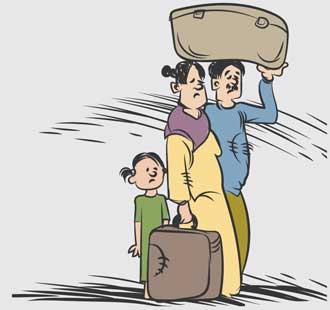20 Jun 2024 - {{hitsCtrl.values.hits}}
 Sri Lanka is one of the countries worst affected by the refugee crisis largely due to the civil war that lasted about 25 years. The root causes for this included political, educational and economic issues with the United National Party governments working according to the globalised market economy system. This was aggravated by the Executive Presidential system which was introduced by J.R. Jayewardene government on February 4, 1978. Since then, the Executive Presidential system has come under widespread criticism so much so that in the 1994 Presidential Election, one of the main candidates, Chandrika Bandaranaike Kumaratunga, promised to abolish it within 24 hrs. She described it as a curse. But as for most politicians, power corrupts and absolute power corrupts absolutely. So the curse apparently became a blessing and she continued with the Executive Presidential system.
Sri Lanka is one of the countries worst affected by the refugee crisis largely due to the civil war that lasted about 25 years. The root causes for this included political, educational and economic issues with the United National Party governments working according to the globalised market economy system. This was aggravated by the Executive Presidential system which was introduced by J.R. Jayewardene government on February 4, 1978. Since then, the Executive Presidential system has come under widespread criticism so much so that in the 1994 Presidential Election, one of the main candidates, Chandrika Bandaranaike Kumaratunga, promised to abolish it within 24 hrs. She described it as a curse. But as for most politicians, power corrupts and absolute power corrupts absolutely. So the curse apparently became a blessing and she continued with the Executive Presidential system.
It exists even today with President Ranil Wickremesinghe being elected to the post by Parliament on the recommendation of former President Gotabaya Rajapaksa who quit halfway through his term when the people’s movement threatened to storm the Presidential Secretariat, and Gotabaya Rajapaksa flew out of Sri Lanka in the night.
Laws have been enacted and practical steps taken to dissolve the refugee and related crises, but as usual, little progress has been made, largely because most leading politicians make big promises in election campaigns, but they are often not kept. We hope President Wickremesinghe will take a different path and practise what he preaches for the sake of future generations and Sri Lanka’s geopolitical strategies and security.
Today (20), the United Nations (UN) marks World Refugee Day and Sri Lanka needs to give high priority to the issue whatever elections are held and when they may be held.
World Refugee Day, which falls on June 20, is an international day designated by the UN to honour refugees around the globe. This day celebrates the strength and courage of people who have been forced to flee their home country to escape conflict or persecution. Every minute, 20 people leave everything behind to escape war, persecution or terror.
In a statement, the UN stated that refugees need our solidarity now more than ever; solidarity means keeping our doors open, celebrating their strengths and achievements, and reflecting on the challenges they face. Solidarity with people forced to flee also means finding solutions to their plight, ending conflicts so they can return home in safety, ensuring they have opportunities to thrive in the communities that have welcomed them, and providing countries with the resources they need to include and support refugees.
The 1951 Refugee Convention and its 1967 Protocol help protect refugees. They are the only global legal instruments explicitly covering the most important aspects of a refugee’s life. According to their provisions, refugees deserve, as a minimum, the same standards of treatment enjoyed by other foreign nationals in a given country.
The 1951 Convention contains a number of rights and also highlights the obligations of refugees towards their host country. The rights contained in the Convention include: the right to work, the right to housing, the right to education, the right to public relief and assistance, the right to freedom of religion, the right to access the courts, the right to freedom of movement within the territory, the right to be issued identity and travel documents, among others.
One of the world’s greatest statesman, Nelson Mandela, a refugee himself, has said: “Those who live in exile as refugees have for long been sustained by their hope for an end to the conflict and the dawning of a better future.”
24 Nov 2024 3 hours ago
24 Nov 2024 6 hours ago
24 Nov 2024 7 hours ago
24 Nov 2024 7 hours ago